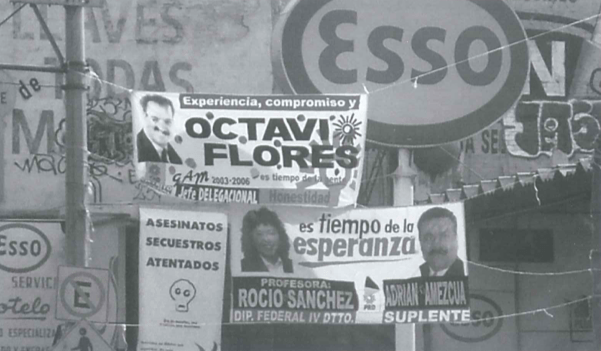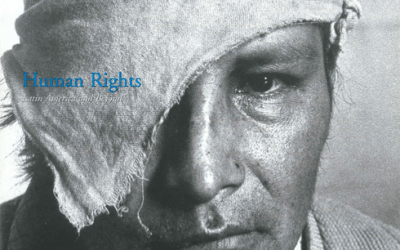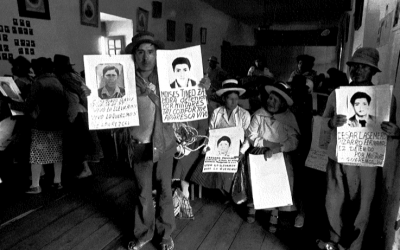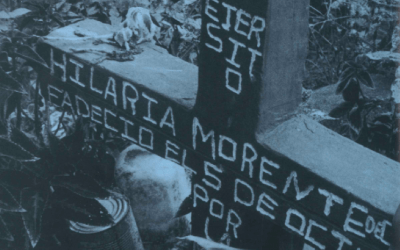Researching Gender Quota
A Student Voyage

Women are part of the political scene; a woman’s campaign poster reads “a time of hope.”
Last spring, as the Mexican political parties began compiling their candidate lists with mandatory quotas for women for the first time, I was teaching a Freshman Seminar at Harvard called “Women’s Movements in Latin America.” I was also writing an article on the Mexican case as part of a project I call “Elected Bodies,” a region-wide study of gender quota laws. I had a sudden inspiration to take my students to Mexico City to conduct research with me. The 11 students in the class struck me as mature and interesting; they had all traveled abroad, and they asked smart questions in class. They would make a great team of research assistants. DRCLAS generously provided us with a grant to cover the students’ airfare and the Freshman Seminar program agreed to pay my expenses. The students were ecstatic. Periodically one of them would interrupt class discussion to say “Hey! We’re going to Mexico,” and everyone would cheer. We arrived in Mexico City at the end of May, right after the semester ended.
We were all going into a new situation. In April 2002, Mexico became the twenty-second country in the world—and the twelfth country in Latin America—to pass a gender quota law requiring a minimum percentage of all candidates for congress to be women. The Mexican Congress has 500 deputies, 300 elected in single-member districts, and 200 elected in 5 multi-member districts of 40 deputies each. According to the new law, 30% of the candidates for the single-member district seats must be women, and at least one of every three spots on the multi-member lists must be a woman. The law contains a strict enforcement mechanism; if a political party fails to comply, it will be denied permission to submit any candidates at all. The law was applied for the first time in the mid-term legislative elections held July 6, 2003.
The trip gave the students first-hand experience doing field research in political science. Before we left, we prepared by generating a list of questions we wanted to ask and hypotheses about what we expected to find, and contacted people to interview. We were fortunate to be able to conduct an interview before we left, with Margarita Gonzalez-Gamio, the Mexican Consulate and former deputy from the Mexico City legislative assembly. The students saw how getting access can depend on knowing the right people, on persistence, on the cachet of the Harvard name or sometimes just serendipity. Many doors opened for us; we conducted nine interviews in just six days, and gave out a lot of Harvard pens as gifts in our wake. Jacqueline Peschard, one of the nine councilors of the Federal Electoral Institute (IFE), explained the intricacies of the quota law to us. Mexico’s leading feminist, Marta Lamas, spoke to us candidly about abortion politics. Journalists at the Center for Communication and Information for Women gave us a behind-the-scenes tour of , an excellent online source for reporting on Mexican women’s issues. Margarita Zavala, a member of the central committee for the National Action Party (PAN) described how her party changed its recruiting tactics in order to get enough female candidates to fulfill the quota law. We had a private tour of the Supreme Court that proved to be so extensive that one of the students passed out from exhaustion. We squeezed in cultural events when we could—including a trip to the Basilica of Guadeloupe and to Teotihuacan.
While one week’s worth of research was not enough to prove or disprove our hypotheses, we heard some instructive stories. Gabriela Cuevas, a 26 year-old PAN candidate for the Mexico City assembly, spent weeks doing door-to-door canvassing in her district. She walked so much she went down two dress sizes. She said that when women would answer the door, many would say, “Oh, let me get my husband. He’s the one who knows about politics,” an indication of the limited degree to which ordinary women identify with female politicians.
Karla Morey, one of the students in the class, reflected on what she learned during the trip. “One of the most important questions that our class was hoping to research in Mexico City was whether or not the women running for office would be experienced and qualified enough for positions in government,” she said. “If inexperienced women were to make poor decisions in office, it could have a negative effect for the future of female politicians in Mexico by discouraging people to vote for women or for parties where women are most highly represented. On the other hand, without imposing laws like the gender quota laws that require better female representation in government, gender inequality may continue to go unaddressed.” As Karla continued, “We posed this question to the government officials we met with. The response most always seemed to be that women were just as equally prepared to handle the job as men; they just needed their parties to put them in seats where they would not just be relegated to positions dealing only with domestic issues. In fact, González-Gamio put this idea into words by saying that people are quick to jump on women who are inexperienced or unsuccessful in government without stepping back to see that there are just as many men who are guilty of the same problem.”
In most cases, the parties complied fully with the letter of the law but disregarded its spirit. Despite our concerns that the parties would find ways to skirt the law, IFE Councilor Peschard assured us that the parties complied fully, “even overcomplied . . . because the penalty was so severe.” Our contacts concurred that the parties had placed the majority of their female candidates in districts where they had little chance of winning—but women did well nonetheless. Women won 23% of the seats in congress—116 of 500. This constitutes a 7% increase from the previous legislature. As student Maria Pilar Barreto remarked, “Many of the people we interviewed, including PAN leader Margarita Zavala and feminist activist Marta Lamas, maintained that gender quotas are the ‘lesser of all evils,’ but nonetheless an important tool to advance gender equality in Mexico.”
Fall 2003, Volume III, Number 1
Lisa Baldez is Associate Professor of Government and Latin American, Latino and Caribbean Studies at Dartmouth College. She was Visiting Assistant Professor of Government at Harvard in Spring 2003.
Related Articles
Human Rights: Editor’s Letter
During the day, I edit story after story on human rights for the Fall issue of ReVista. During the evening, I work on my biography of Irma Flaquer, a courageous Guatemalan journalist who was…
ONGs en América Latina y los derechos humanos
Las ONG ofrecen mil modos de recordar la dignidad humana a los gobiernos y las sociedades. Las dos experiencias que esbozo en esta nota reflejan algunas de las estrategias asumidas por…
Peru’s Human Rights Coordinating Committee
The human rights abuses that devastated Peru from the early 1980s to the mid 1990s are once again an issue of debate in that country with the release of the Peruvian Truth and Reconciliation’s…




